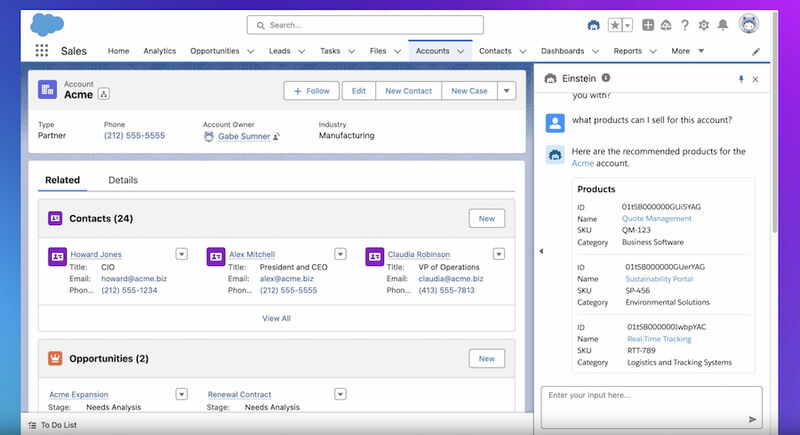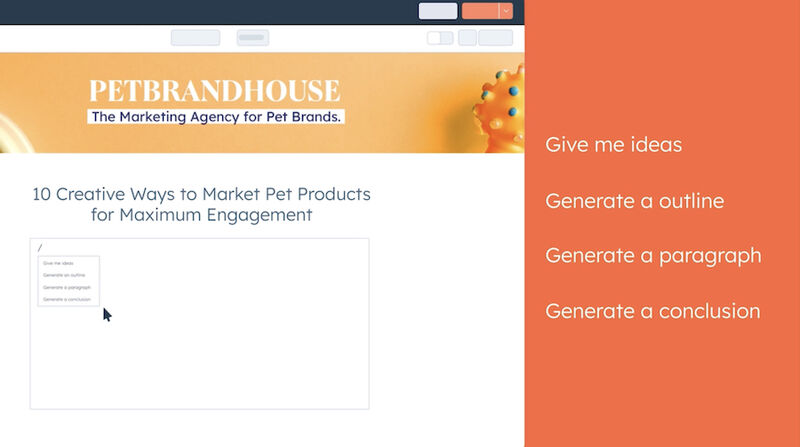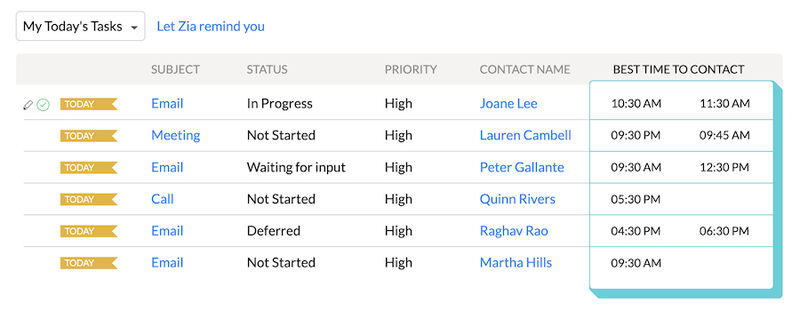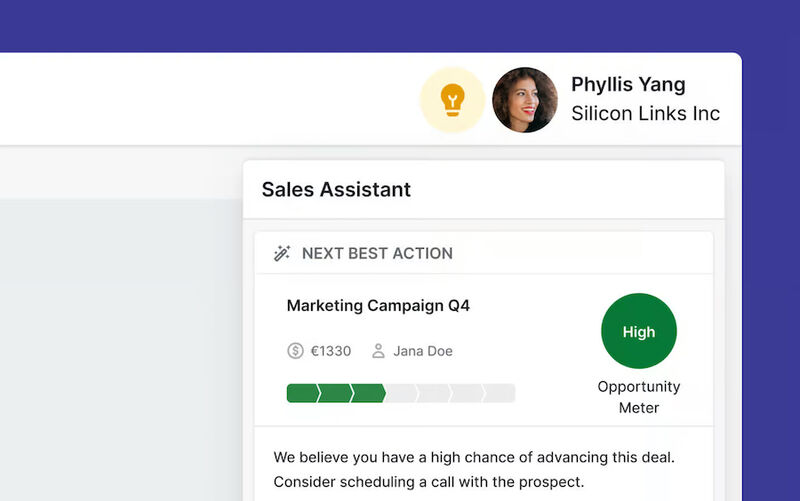Artificial intelligence (AI) is used in numerous ways by many different professionals. While next-gen AI systems are, for the most part, still in their infancy stages, they are increasingly making their way into many different industries, fields, and professions—including customer relationship management (CRM). Here, we explore the different uses of AI in CRM, the key benefits of AI in CRM systems, and the top examples of CRM solutions with built-in AI tools.
What Is AI in CRM Systems?
Most modern CRM systems now integrate AI tools to enhance the process of managing customer relationships and communication. These tools leverage machine learning (ML), natural language processing (NLP), and predictive analytics to identify patterns, trends, and insights that humans would not be able to detect right away. When used correctly, CRM with AI can help improve your customer engagement, lead nurturing, and sales performance.
Common Types of AI for CRM
There are many different AI systems in use today. For the purposes of AI for CRM, we’re generally concerned with three: generative, conversational, and predictive. Not only are these among the most popular and substantive AI systems available today, but they all have pertinent applications in the field of CRM.
As the name implies, generative AI is primarily focused on creating—or generating—something new. In order to function efficiently, however, the generative AI model needs to be trained or fed relevant information. As such, generative AI often includes biases, intentional or not, that it learned from the training material. Common applications of generative AI in CRM systems include the following:
- First-party data collection and auto-population
- Next-best action recommendation for reps
- Suggested products for customers
- Content creation for blogs, emails, and other communications
This type of AI is designed to mimic human speech patterns to facilitate life-like conversations. Conversational AI uses NLP to understand and learn the human language. Much like generative AI, conversational AI requires training to function properly, efficiently, and effectively. In most cases, this training comes in the form of plaintext data or prerecorded audio files, which are then processed through the system’s NLP algorithms. Examples of its applications include the following:
- Web-based and mobile chatbots
- Intelligent voice assistants
- Quick replies to frequently asked questions (FAQs)
The third type of AI for CRM, predictive AI, uses statistical analysis to identify trends in past events and predict future ones. In this case, the AI system should be trained using as much data as possible. The more data you provide—and the accuracy of that data—ultimately determines how effective your predictive AI will be. Some of its applications include the following:
- Prioritizing leads
- Spotting key purchase influencers
- Tailoring sales initiatives based on past trends
Key Benefits of AI in CRM Systems
There are a myriad of benefits associated with the day-to-day usage of AI based CRM platforms. While many benefits are specific to the type of AI used, others are more general. As such, they can be said about most—if not all—of the AI-driven CRM solutions that are available today.
Segments Customers
Customer segmentation refers to the process of categorizing your customers into different groups based on the characteristics they have in common. These include geographic location, purchasing habits, or the likelihood of making a purchase. AI segmentation tools in CRMs can analyze customer data and give you the details needed for creating customer profiles. Your team can deliver targeted campaigns and communications based on these profiles.
Maintains Competitiveness
AI-powered CRM software helps you maintain competitiveness, too. With so many companies embracing AI, some of which are likely to be direct competitors of your business, it’s critical that you’re able to operate on the same level. If your competition is currently using AI, you’ll have little choice but to join them.
Facilitates Cost Savings
The strategic combination of AI and CRM software can help reduce your overhead costs, too.
Although there is an initial investment involved, as well as recurring costs in the form of service subscription fees, AI-driven CRM systems can reduce operational costs in a variety of ways, including the following:
- Reducing the cost of initial customer acquisition and conversion
- Strengthening customer retention
- Eliminating or reducing the need for paper and office supplies
- Streamlining the sales process
- Automating menial and redundant tasks
Remember, the purpose of CRM software is to automate many of the menial activities associated with managing and maintaining customers on a day-to-day basis. Since current AI systems are already being used in a similar fashion, the two are a natural fit.
Typical Use Cases of AI in CRM Software
While next-gen AI can be used to complement CRM software in a plethora of different ways, there are some applications that are more common than others. Not only have the following use cases been implemented by numerous companies to date, but these specific functions are likely to see continuous development, updates, and refinement throughout the years.
Current AI systems are capable of automating email correspondence within your CRM platform. Email marketers typically have many day-to-day responsibilities, from generating leads and compiling contact info to proofreading email copy and analyzing campaign performance, so any tool that can reduce their workload will be greatly appreciated by your team.
In the case of an AI-powered CRM, email automation usually comprises the following features:
- Writing and sending email copy
- Using A/B testing to gauge performance
- Segmenting customers according to various demographics
- Upselling and providing personalized product recommendations
- Analyzing data and reporting results
Most CRMs support automated emails at various stages in the customer pipeline. For example, new customers who create accounts might receive automated welcome emails. Those who make purchases might automatically receive purchase confirmations, and past customers might receive customer satisfaction surveys every few months.
Modern CRM software also uses AI to perform simple and routine account maintenance. Some common tasks include the following:
- Extracting data from contract agreements, invoices, and other documents
- Identifying leads or upselling opportunities based on their general profile or behavior patterns
- Scheduling customer appointments, consultations, or product demonstrations
- Creating online accounts on behalf of new customers
Current AI systems are highly efficient when tackling menial or redundant tasks like these. This ultimately reduces the workload of your entire team while giving you the ability to assign your top talent to more important activities.
If your team is struggling to convert new leads into paying customers, look no further than AI. Not only are AI CRM systems capable of managing relationships with established customers, but many AI systems can successfully convert leads, too. Here’s a summary of how AI can help with lead conversion:
- Generative AI: Creates promotional content for a new product or service
- Conversational AI: Describes key features or benefits of a new product or service
- Predictive AI: Forecasts potential sales based on past data
AI is often used for sales forecasting. When properly trained with accurate data, the current generation of AI systems tends to perform quite well in this area. In most cases, forecasts are made by analyzing historical sales data. The AI algorithms then look for distinct patterns or trends, which could indicate success (or failure) in a certain region or amongst a specific demographic.
As with traditional forecasting strategies, however, the final results really depend on the quality of the data that is used in the first place. If inaccurate, incomplete, or otherwise poor information is fed into the AI system, it will naturally produce a comparable result.
Top Examples of AI CRMs
Many of the most popular CRM vendors already offer AI integration. While some offer AI functionality as a third-party integration, others, like the ones mentioned below, offer built-in AI systems that are already in use today.
Frequently Asked Questions (FAQs)
The scope of AI technology in CRM is vast but is continually expanding. As of now, CRMs integrate ML, NLP, and predictive analytics technologies to streamline business processes and manage relationships. Future innovations in AI CRMs could include hyper-personalized communication, AI-powered customer journey mapping, integration with augmented reality (AR), and predictive maintenance.
The top challenges of using AI in CRMs are data security and privacy concerns, given that CRM systems collect and analyze a huge amount of data, often in real-time. In addition, it can become challenging to integrate AI into CRMs due to technical issues or skill gaps among employees. Lastly, providers of AI CRMs should consider the ethical use of these tools by maintaining transparency in how they operate and handle customer information.
While AI is transforming how sales and marketing teams work, as evidenced by the rise of AI-powered CRMs, these tools are designed to augment rather than replace the human salesforce. That said, it is best to find a balance between AI-driven decision-making and real human input and creativity.
Bottom Line
For organizations that want to make the most of their customer relationships, there’s really no better choice than an AI CRM solution. Given the current state of AI and, specifically, its potential for the future, top companies are already embracing the use of AI in CRM systems. This helps them better anticipate customer needs, provide customized solutions, and deliver best-in-class customer service across the board.



